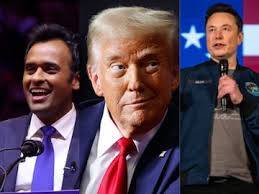**Trump Sides with Tech Bosses in MAGA Fight Over Immigrant Visas**
In a surprising twist within the broader debate over immigration policy, former President Donald Trump has recently sided with major technology CEOs in pushing for expanded access to foreign worker visas. This stance is particularly noteworthy, as it comes amid the continued ideological conflict between Trump’s MAGA (Make America Great Again) movement, which has generally championed restrictive immigration policies, and the needs of the U.S. tech industry, which has long relied on foreign talent to fill high-skilled positions. Trump's new position, in which he advocates for increased H-1B visa caps and other pathways for skilled workers, marks a departure from some of his past rhetoric and actions but also underscores his ongoing relationship with Silicon Valley.
### The Background: MAGA and Immigration
Under Trump’s leadership, the Republican Party adopted a hardline stance on immigration. The former president made a major focus of his political platform the notion of "America First," which included reducing both legal and illegal immigration. His administration enacted policies such as the "Muslim Ban," the end of Temporary Protected Status for certain immigrant groups, and an overhaul of the H-1B visa program that made it harder for tech companies to hire foreign workers. Trump's rhetoric often painted immigrants, particularly those entering on work visas, as taking jobs away from American citizens and placing undue pressure on social services.
However, Trump’s relationship with the business community, especially in the tech sector, has always been complex. Many tech giants, including companies like Google, Microsoft, and Apple, have lobbied for more visas, arguing that they are vital for ensuring that they can access the highly skilled labor necessary for their growth and innovation. This dichotomy has now become more pronounced as Trump’s public remarks reflect an apparent shift.
### Trump’s Shift Toward Tech Industry Needs
In recent months, Trump has begun to align himself with the interests of the tech industry, particularly around the H-1B visa program. Historically, the H-1B visa program has been a cornerstone for tech companies looking to hire foreign workers in science, technology, engineering, and math (STEM) fields. Each year, the U.S. government issues a limited number of these visas, and the demand often far outstrips the supply, leading to a lottery system for allocation. The Trump administration had previously sought to curtail the program, arguing that it was being misused to replace American workers with cheaper foreign labor.
However, Trump has recently signaled a more favorable stance toward increasing the number of visas available for skilled workers, asserting that this will allow American companies to remain competitive on the global stage. In a statement made earlier this year, Trump said, "American companies cannot compete globally if they don’t have access to the world’s best and brightest." He further argued that denying tech companies the ability to hire top-tier talent from abroad harms the U.S. economy and limits innovation.
This statement marks a significant departure from his previous positions, where he voiced concerns about the tech industry’s reliance on foreign labor. Trump’s new stance likely reflects the increasing pressure from corporate America, which has repeatedly warned that without a steady stream of foreign talent, U.S. companies will fall behind international competitors, especially as countries like China and India have ramped up efforts to attract skilled workers in tech fields.
### The MAGA Divide
The Trump administration’s embrace of a more open immigration policy for tech workers is not universally welcomed within the MAGA movement. Some of Trump’s most ardent supporters within the Republican Party argue that increasing immigration—whether legal or illegal—undermines the interests of American workers. They contend that increasing the number of visas for skilled workers would ultimately displace U.S. citizens, particularly in the tech sector, where wages for entry-level positions can be quite competitive.
In addition to concerns over job displacement, there is also the issue of national security. A vocal faction of Trump’s base believes that loosening immigration rules could allow for foreign nationals with questionable ties or intentions to enter the U.S. under the guise of employment, a concern that has been a consistent theme in Trump’s rhetoric on immigration.
Despite these concerns, Trump’s alignment with tech leaders suggests that he sees a pragmatic need to balance the demands of American businesses with his broader populist agenda. Tech companies, which are some of the most influential and wealthiest in the world, have immense lobbying power, and their interests may be too significant for Trump to ignore if he wishes to remain a key figure in the political landscape.
### Implications for 2024
As Trump gears up for a potential run in the 2024 presidential election, his shift on immigration policy may be an effort to reconcile his past promises to his base with the reality of the modern economy. The global competition for top-tier talent has only intensified, and as the world becomes more interconnected, the need for skilled workers is expected to grow. Trump’s support of more visas for tech workers could serve as a strategic pivot to attract business-minded voters while attempting to avoid alienating his loyal MAGA base.
This evolving position also reveals the increasingly intertwined relationship between American politics and Silicon Valley. While the tech industry has historically leaned more liberal on social issues, it is now finding common ground with conservative politicians like Trump when it comes to immigration policy. This could signal a shift in the political landscape, where issues like tech innovation and immigration reform transcend traditional partisan divides.
In conclusion, Donald Trump’s shift toward supporting expanded immigrant visas for the tech industry represents a significant, albeit surprising, evolution in his immigration policy. It illustrates the complicated intersection of populist politics, economic pragmatism, and the evolving needs of the U.S. business landscape. Whether this change will resonate with his base or alienate them remains to be seen, but it highlights the growing influence of corporate America in shaping immigration policy.



No comments yet
Be the first to share your thoughts!